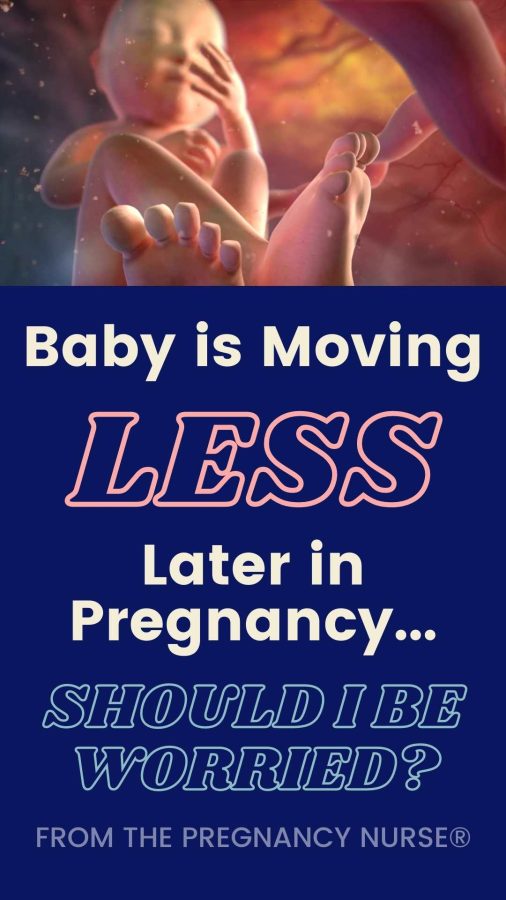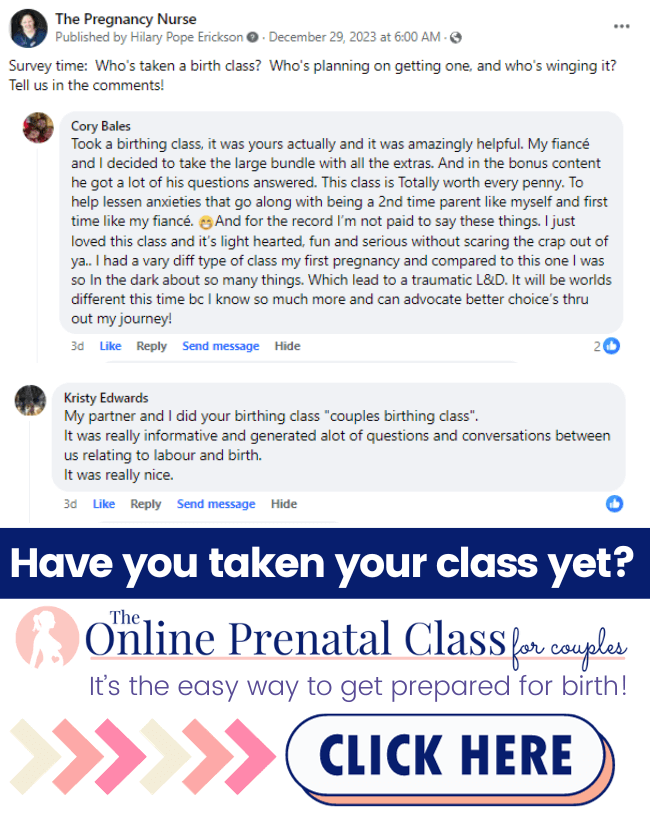If you’re doing kick counts, or just feeling your baby move — what is the normal daily fetal movement count. This article will tell you what is normal for you and how you count them to make sure baby is doing well.

But first, how do I know so much about fetal movements? Hi — I’m Hilary — The Pregnancy Nurse 👩⚕️. I have been a nurse since 1997 and I have 20 years of labor and delivery nursing experience, I am also the curly head behind Pulling Curls and The Online Prenatal Class for Couples. 🩺 I have explained fetal movement to tens of thousands of families (if not millions at this point) and I know when you should see your provider — so I’m excited to share this info with you!
I also have a video that answers MANY common questions:
What is the Normal Daily Fetal Movement Count?
This is entirely depending on what is normal for you. Meaning if it normally takes an hour to feel 10 movements, that’s your “norm”. When it varies a lot from your norm you need to talk with your provider.
But, as with all of pregnancy it’s more complicated than that — so let’s talk more about it.
BTW, kick counts are AMAZING and I have a free cheat sheet right here:
When to worry about fetal movement?
This is the big question right. If fetal movement is your best indicator of fetal well-being, when should you worry?
First off, babies go through sleep/wake cycles (just like they will when they are born) — so it’s normal for baby to be asleep for a while and not to feel it for a bit. But, then it wakes up and the kicks begin again.
That’s why it’s so important to do kick counts.
Here’s the basic process on how to do fetal kick counts (recommended to start doing these after 28 weeks). I have a whole post on when to start doing kick counts.
- Get comfy laying or sitting down (try to limit other stimulus while you’re doing kick counts, it can be a good “quiet time”). Meaning, I recommend doing this screen-free for the most part (harder if this takes longer than 30 minutes)
- Note the time. Just like it’s 6:49 pm (seconds not needed) — for me I’d have to write this down somewhere, or start a timer because pregnancy brain.
- Start feeling the kicks. Count them as you feel them. You can use an app or your fingers (back in my low-tech days I used my fingers).
- Note when you get to 10 movements. Aka, it’s now 7:15
Kick Count Pro Tips:
- You’re looking for ANY movements (not really just kicks) except for hiccups. These movements will change as baby gets bigger/the uterus gets smaller for them. This means turning, shifting, rolling — all of those count.
- Hiccups are very rhythmic small movements — if you’re not sure what they are talk with your provider at your next visit. Most people are very aware of what they are — just tiny little “bumps” that happy every few seconds for a while.
- I like to do this after I’ve eaten, and I like to have a glass of ice water next to me to perk baby up. Plus, hydration is the best. If you notice a time that baby often moves a lot, that’s a good time to aim for (simply because they will take less time).
- A lot of people like to use an app like the count the kicks app (or many popular pregnancy apps also have a kick count option.
I see a lot of people saying how to do kick counts WRONG online — so make SURE you follow the rules (don’t forget that cheat sheet you can download right here):
What time of day to do kick counts?
I think it’s best to do them at a time where you feel many movements already. I chose to do mine after dinner — it made it real fast to get them to move 10 times.

What is the normal daily fetal movement count in the third trimester?
This is the big question — you hear your friend only takes 10 minutes to get their kicks in, but yours takes an hour — is that OK? Most professionals say you want to feel those 10 movements in 2 hours. So, if you’re doing it in under 2 hours and you’re able to feel at least 10 minutes movements, that’s a good sign. Average is probably under one hour though — but it really only matters what YOUR average is.
But again, the big question is what is normal for YOU as you count kicks. If it takes 10 minutes normally, and 2 hours the next day — that’s an issue and you need to talk with your provider asap (and if you can’t get hold of them go to the hospital). But if it takes an hour today, and then an hour and 5 minutes tomorrow that’s pretty similar.
The hospital wants to see you if you’re not feeling baby move. I get just as nervous when patients come-in saying they haven’t felt baby move and I want to get that baby on the monitor as soon as possible. I am really serious about this, don’t feel weird about it.
Prefer video — I have the basics in here too:
What does it mean if there is increased fetal movement at 38 weeks?
I have a whole post on increased movements before labor (and if it can be a sign of labor). The theory is that baby may shift more as they get into the birth canal. Also, sometimes you feel baby more as they get bigger.
However, if baby’s movements really seem drastically different (honestly crazy amounts MORE or any less) always call your provider. Remember, fetal movement is your best indicator of fetal well-being.
We talk about those tests they can do on baby plus all the signs of labor in The Online Prenatal Class for Couples. It really can help any anxiety you have about baby or delivery with rock-solid information for both of you!
When to worry about fetal movement in the second trimester?
Kick counts aren’t actually recommended until you enter your third trimester (about 28 weeks). Prior to that fetal movement just isn’t as consistent for most people. Some days baby will feel crazy, but they may move position a bit and then you don’t feel much the next day, and all of that can be normal.
However, if you ever feel like fetal movement is really different do call your doctor!
Fetal movement at 24 weeks what is normal?
At 24 week some people will have just started feeling baby move (this is often due to a posterior-lying placenta that cushions you from their movements). Some people will feel baby moving like crazy for weeks. Because it is so different for for each person it is just not possible to pinpoint “normal”. And, like I said above as baby shifts position in the uterus (because there’s still quite a lot of room in there) it can change day to day.
As your baby gets bigger the movements will become more consistent.
What does baby movement feel like?
It varies from person to person but early on most people describe it as a “flutter” (honestly, not that different from gas). Then it moves to smaller kicks and then advances from there.
All of pregnancy (including simple movements) can be a bit confusing — so join me in my tailored-to-you pregnancy newsletter — you can pick where you are and I’ll send you info JUST for you:
When can you feel baby kick from outside?
Everyone pictures that magical moment when your partner can finally feel baby like you can — and darn it, it DEPENDS (seriously, I get that this is the worst answer). It depends on how your uterus is lying, where the placenta is, and how your body fat is located around the uterus.
That day WILL come though, and sometimes my husband would watch my stomach feeling like an alien had taken me over — frankly, he wasn’t far from wrong. 🙂
This is another good thing to do with your partner. 😉
How many times a day should i do kick counts?
Just once. You should monitor for fetal movement all day long. But that’s not really possible to concentrate on baby all day long — so kick counts are a special time for just the two of you (or three+ of you if you have multiple babies in there). I actually think it’s a great time to bond with baby too!
How to wake up baby for kick counts?
It can be off-putting to have baby move like crazy all day long and then you sit down to do kick counts and they’re quiet.
Personally, that’s why I always did them after a meal when my blood sugar was up and with a cold glass of water. That ice water sits in the stomach which does transfer to baby and the coldness wakes them up most often.
However, if baby truly isn’t moving you need to call your provider. On your way to the hospital you can always drink some ice water to see if baby perks up….
What are the reasons for decreased fetal movement?
Who really knows, babies are weird. But here are a few reasons for it actually being less movement or feeling it less:
- Baby’s position (if they’re kicking towards your back you may not feel it as much)
- Not eating or drinking throughout the day (that’s why taking care of yourself is so important).
- Something being wrong with baby, or baby not getting the blood flow they need — this is clearly what we’re watching for.
- Maternal illness (like a flu or something)
I am shocked by how many moms come in saying their baby hasn’t moved and they haven’t eaten anything for HOURS. Making sure you’re giving baby the fluids and nutrition is such an important part of your pregnancy. It also rules out not eating as a factor in why baby isn’t moving.
I think this is so important important I actually added a nutrition section to The Online Prenatal Class for Couples just for this very reason.
This all to say that if baby is moving less you need to contract your provider and if you’re feeling more worried go to the hospital (I would still call your provider on your way and drink a glass of ice water).
So, What do fetal kick counts do?
A study showed that when providers promote kick counts there was 26% less. Kick counts can prevent stillbirths. That’s why I love them so much. I talk more about that in my post on when to go to the hospital for decreased fetal movement on my sister site.
When to go to hospital for decreased fetal movement?
If baby is moving less you need to go to the hospital (can I say this enough?) I just did a post on if you should go to the ER or to labor and delivery, but you can always show-up to the ER and they can send you to the right spot. However, it’s a good question to ask your provider at your next appointment. You can also call the hospital to see if they do tours. That’s something they usually address on the tours (as well as where to park).
So, as we tie-up this post on fetal movement- a few things:
- Everyone feels fetal movement differently — don’t compare yourself to others.
- If baby’s movements have changed you should contact your midwife or obstetrician.
- If you’re not feeling baby move (and you normally feel a good amount of movement in your third trimester) go to the hospital asap.
- Kick counts prevent stillborns. The end.
These are hard and fast rules. I am not kidding to say that we take fetal movement just as seriously as you do at the hospital. There is no nurse wondering why you came in. We’re glad you’re there.
All of this can be kind of scary, but The Online Prenatal Class for Couples can really simplify it for you in just a few hours.
Looking to get prepare for your birth? I have some easy options for you!
~~~~~~~~
– Worried you’re missing something? Grab my pregnancy planner so you don’t miss a thing!
– Thinking about an induction? Grab Inductions Made Easy to feel prepared in just 20 minutes!
– Wondering how to get that baby OUT? Grab Going Into Labor Made Easy so you know how to (and not to) do it!
– Postpartum got you anxious? Check out Postpartum Care Made Easy so you can stay SAFE even when all your attention is on that little on.
🚨 AND if ALL OF IT has got you on edge The Online Prenatal Class for Couples is perfect for you — You’ll feel so ready before you even know it!
~~~~~~~~
No matter WHERE you are at in your pregnancy journey, we have resources that can help!
And, if you’re not quite sure you’re ready for that whole thing, check out my free prenatal class. It’s your first step toward getting in the driver’s seat of your birth.











 Signs You’re Ready to Be Induced
Signs You’re Ready to Be Induced
